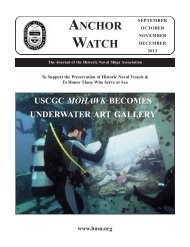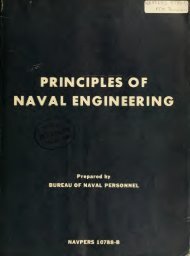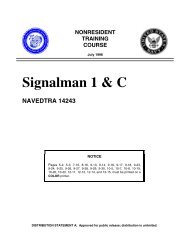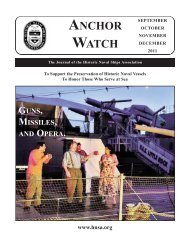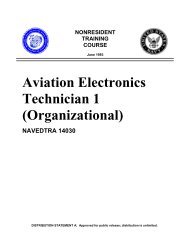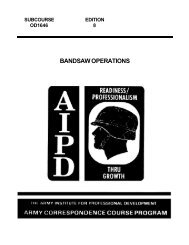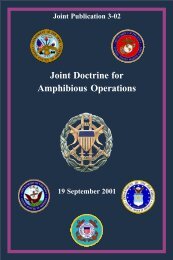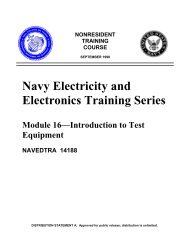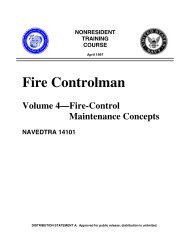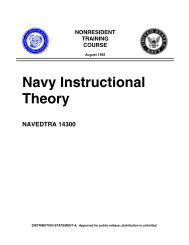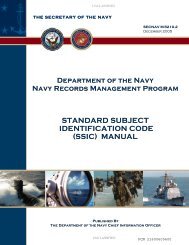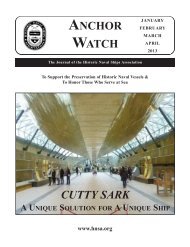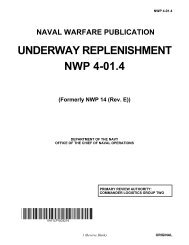OPNAVINST 1710.7A - Historic Naval Ships Association
OPNAVINST 1710.7A - Historic Naval Ships Association
OPNAVINST 1710.7A - Historic Naval Ships Association
Create successful ePaper yourself
Turn your PDF publications into a flip-book with our unique Google optimized e-Paper software.
<strong>OPNAVINST</strong><br />
15 Jun2001<br />
171O.7A<br />
CHAPTER 7<br />
Cards and Calls<br />
Traditionally, naval officers were expected to pay formal social calls on their<br />
commanding officers when reporting to a new duty station. The new officer, accompanied by<br />
his/her spouse would visit the commanding officer’s home for 15-20 minutes and leave calling<br />
cards.<br />
Times have changed, however, and the trend is toward less formality in social settings.<br />
The formal exchange of social calls is generally not required today. It is far more common for a<br />
commanding officer to host large scale receptions to welcome newcomers and bid others<br />
fmewell. An officer should always inquire as to the new command’s policy.<br />
Should formal calls be desired, the following general guidelines are observed. An<br />
appointment should be made, and the officer and spouse arrive promptly at the residence of the<br />
commanding officer. Usually a social call lasts 20 to 30 minutes, with light, pleasant<br />
conversational exchange. The appropriate number of cards is left on a silver dish or tray located<br />
on a table near the door. The officer paying the call leaves one of his cards for the husband and<br />
one for the wife, as well as one for each lady in the house cwer 18, not more than three cards<br />
being left by any one person. The civilian woman leaves one card for each lady of the house<br />
over 18, but never for a man, not even the President. A man can never make a call for his wife<br />
nor leave her cards, although she may make calls and leave cards for him, except in the case of a<br />
call on his commanding officer.<br />
Exceptions to this recent trend are few, but often include officers on military and<br />
diplomatic assignment in foreign countries. These individuals often call on officials within their<br />
own embassy and military activity, on officials of the host govenunent, and on diplomatic<br />
representatives of other governments. In these cases, it is best to check with the protocol officer<br />
of the U.S. embassy for guidance on local customs.<br />
CALLING<br />
CARDS<br />
Despite the fact that formal social calls are rarely made, calling cards are still useful in<br />
many situations. They are sent with flowers or gifts, as infbrmal invitations to informal parties<br />
of any type, as reminders, or as bearers of messages of condolence or congratulations.<br />
Accordingly, a supply of envelopes that approximate the size of the card and yet conform to<br />
existing postal regulations is a wise investment.<br />
It is a great help and often economically advantagecms to patronize only the finest<br />
engravers. They generally know the correct use of titles and social forms and are qualified to<br />
advise concerning the type size, paper quality, and similar matters. Some are also willing to help<br />
the junior officer to economize by making three cards, namely the joint card, personal card, and<br />
the wife’s card from a single plate. Many engravers will keep a plate on file and fill subsequent<br />
mail orders,<br />
Calling cards need not be engraved. The more economical process of thermography that<br />
produces a raised print is a very acceptable substitute.<br />
7-1<br />
Enclosure (1)



